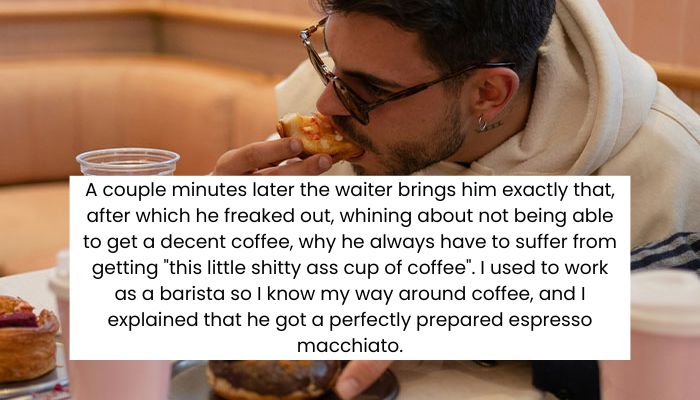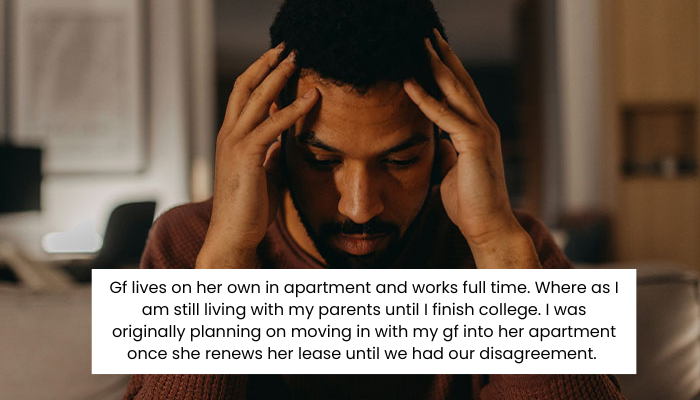My Detective Fiancé Treats Me Like a Suspect—Not a Partner, and It’s Breaking My Heart
When you fall in love with someone who dedicates their life to finding truth and justice, you expect honesty, loyalty, and maybe a little extra protection. That’s what one woman thought when she fell for her fiancé, a homicide detective. After nearly four years together, though, she’s realizing his professional instincts might be bleeding into their relationship in ways that feel more controlling than caring.
At first, the red flags seemed small—little habits she brushed off as part of his “cop mindset.” He liked to double-check things, stay cautious, and question details. But over time, those habits turned invasive. He started recording their arguments “for communication,” keeping hidden folders of audio files, running background checks on her friends, and disappearing for hours without explanation.
Now she’s starting to wonder if this is love or surveillance. Every conversation feels like an interrogation. Every disagreement becomes a piece of “evidence.” She’s torn between compassion for his line of work—and fear that she’s being emotionally cornered by someone who’s forgotten how to turn off the detective switch at home.
When one partner simply can’t trust their other half, then problems will start cropping up in their relationship

The poster shared that when she and her fiancé got together four years ago, her friends and mom were against it, stating that dating a cop would be tough








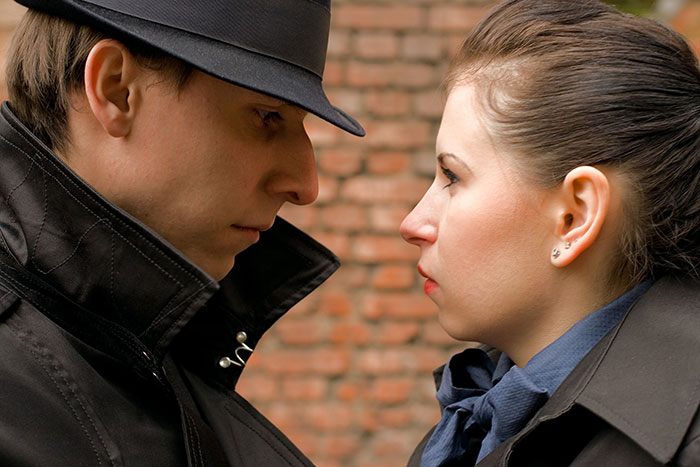




Okay, let’s be real—dating someone in law enforcement sounds intense but also kinda reassuring at first. You imagine safety, stability, someone who “gets it” when it comes to danger and truth. But sometimes, that mindset can cross over from protective to possessive, and that’s where things get messy.
Let’s unpack this because what you’re describing isn’t just about trust issues—it’s about control disguised as caution. And that’s something that creeps up slowly until you realize you’re walking on eggshells in your own relationship.

First off, the recording arguments thing is a huge red flag. Sure, he might frame it as a way to “communicate better” or “avoid misunderstandings,” but secretly saving those recordings changes the power dynamic completely. It’s not mutual—it’s surveillance. There’s a big difference between wanting clarity and building a digital archive of your partner’s emotional responses. Psychologists often link that behavior to emotional abuse and coercive control, where one partner uses evidence or information to maintain power over the other.
Now, in relationships where one partner works in law enforcement, it’s not uncommon for them to develop what’s called “hypervigilance.” This is basically when someone’s constantly on alert, scanning for danger, always expecting the worst. It’s a psychological adaptation from trauma or stress—super common among detectives, soldiers, and first responders. But when that vigilance turns inward toward loved ones, it morphs into suspicion.
That “You know I only trust what I can verify” line? That’s textbook hypervigilance talking. But it’s also a warning sign of a toxic relationship pattern forming. Because love requires trust by default—not verification like you’re being cross-examined.
Let’s talk legality for a sec because the recordings and background checks hit another nerve. Depending on where you live, recording private conversations without consent can actually be illegal under two-party consent laws (states like California, Pennsylvania, Florida, etc.). So not only is this emotionally damaging—it might be crossing legal boundaries. The background checks are another story. Cops often have access to restricted databases that civilians can’t use. If he’s using police resources to dig into your friends or co-workers? That’s a massive misuse of authority and could cost him his badge if reported.
But let’s zoom out. Why do people like him do this? A lot of homicide detectives spend years steeped in lies, betrayal, and violence. They see the worst of people daily. Over time, they start believing everyone is hiding something. They start seeing patterns even where none exist. It’s called occupational cynicism—basically, their job rewires how they view trust.
Still, that doesn’t excuse it. When that cynicism leaks into personal life, partners often end up feeling monitored instead of loved. Imagine being constantly evaluated like your honesty is always under cross-examination. It eats away at emotional intimacy.
Now, those comments about tracking future kids? That’s control escalating under the mask of “protection.” Sure, every parent worries about safety—but there’s a healthy level of concern and then there’s obsession. Saying things like “I’ll do background checks on every teacher” might sound like humor or caution, but it’s also planting the seed for paranoid parenting. Kids raised in that environment often grow up anxious, distrusting, and socially isolated because their parents’ fear controls their freedom.
You mentioned thinking about suggesting therapy, and honestly—that’s a great move, but it might be tough. Many law enforcement professionals avoid therapy because of stigma. There’s this belief that “if you need therapy, you’re weak,” or that it might jeopardize their standing at work. But ironically, therapy—especially trauma-informed therapy—is exactly what could help him separate the detective mindset from the partner mindset.

The key here is communication with boundaries. When you bring it up, don’t frame it like “you’re paranoid” (even if it feels that way). Instead, focus on the impact of his actions on your emotional well-being. For example:
“When you record our arguments, it makes me feel like you don’t trust me, and it’s hard for me to open up when I feel monitored.”
That shifts it from accusation to emotional truth. It’s harder to argue with how someone feels than what they did.
If he still refuses to listen or dismisses your feelings as “overreacting,” then it’s time to protect your peace. You’re not overthinking this—you’re responding to behavior that’s objectively controlling. And love shouldn’t make you feel like you’re under investigation.
One thing you could quietly start doing is documenting these instances—not to fight fire with fire—but to protect yourself if it escalates. If he’s already recording you, you have every right to gather your own notes about patterns of behavior. If you ever need to leave suddenly or seek help, that record could matter.
Also, consider talking to a therapist on your own first. They can help you set emotional boundaries and guide you through difficult conversations safely. If it feels too heavy to manage alone, organizations like The Hotline (1-800-799-7233) or local domestic support services can offer confidential advice without labeling your relationship prematurely.
And here’s something most people forget: you’re allowed to love someone and still realize they’re bad for your peace. You can respect his profession and still refuse to be collateral damage from it. Relationships are supposed to be safe spaces, not interrogation rooms.
If he can’t turn off the detective lens and see you as his partner instead of a potential liar, that’s not a partnership—it’s a power imbalance. Love requires vulnerability, not verification.
So yes, bring up therapy. Set limits. If he refuses, make a plan for your emotional safety first. You don’t owe anyone your trust just because they wear a badge. You owe yourself the kind of peace that doesn’t come with an evidence folder.
People urged the poster to recognize the red flags in her relationship and to end things immediately

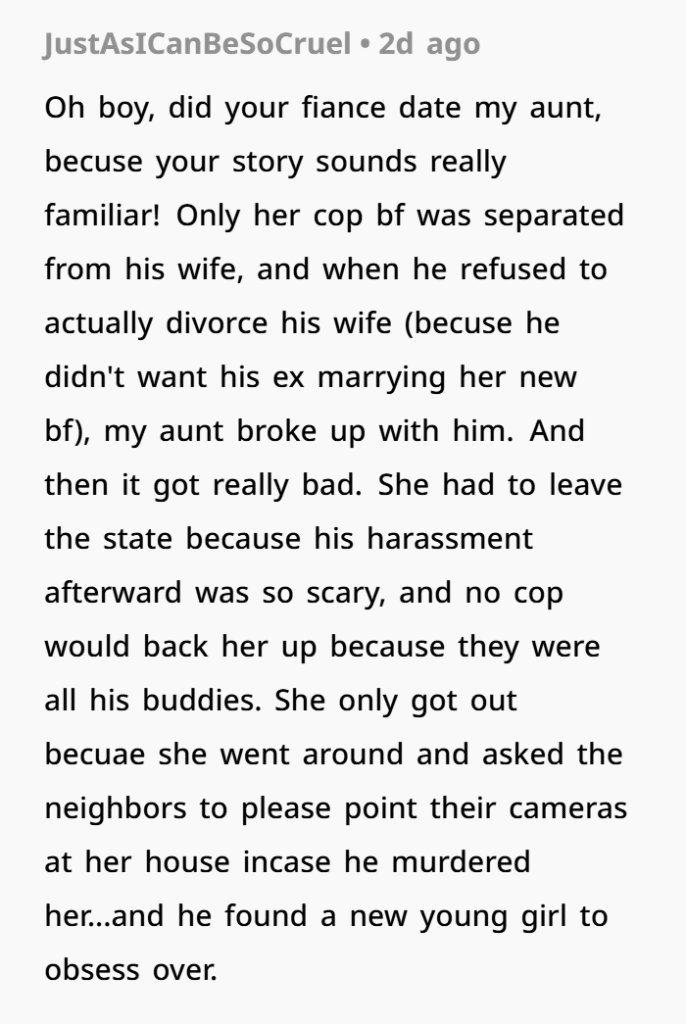
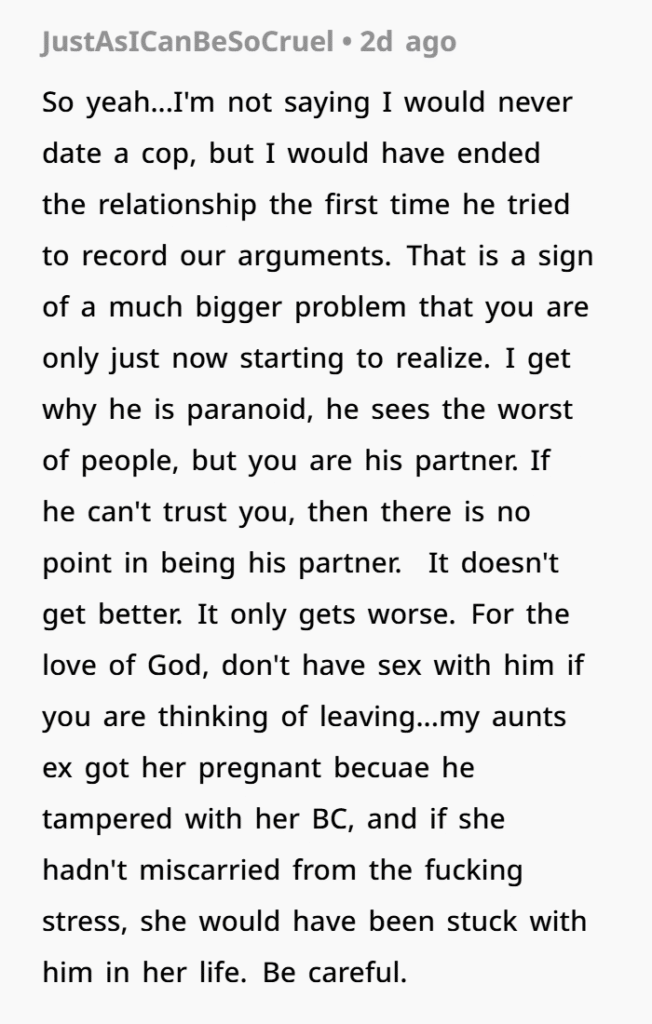



Love shouldn’t feel like being cross-examined. If your partner treats you like a suspect instead of someone safe, that’s not love—it’s control wearing a uniform.


